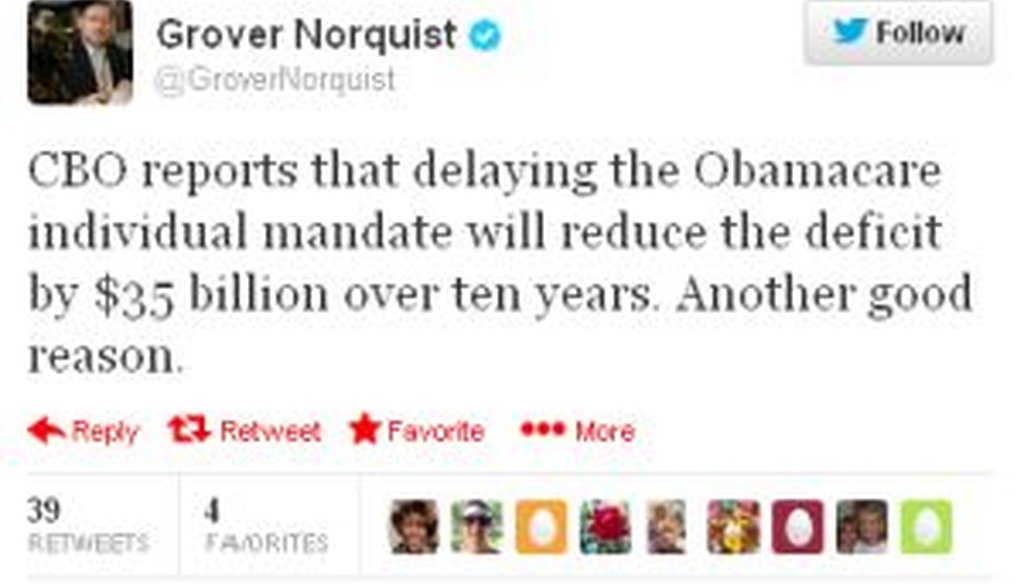

Our only agenda is to publish the truth so you can be an informed participant in democracy.
We need your help.


Conservative activist Grover Norquist recently tweeted that delaying the individual mandate under President Barack Obama's health care law would save $35 billion over 10 years. Is that correct?
Grover Norquist, who heads the conservative, anti-tax group Americans for Tax Reform, is no fan of President Barack Obama’s health care law. In a tweet sent on Sept. 8, 2013, Norquist cites research by the Congressional Budget Office -- the independent budget-analysis arm of Congress -- to quantify how much money the federal government could save by delaying some of the health care law’s key provisions.
"CBO reports that delaying the Obamacare individual mandate will reduce the deficit by $35 billion over 10 years. Another good reason," Norquist tweeted.
Is Norquist right?
The tweet refers to a CBO analysis released on Sept. 6, 2013. The agency looked at the potential impact on the federal budget if a bill that has already passed the House were to become law. The bill includes a one-year delay of the start of the requirement that individuals secure health insurance coverage, as well as a similar delay of the tax penalties assessed for not complying with that "individual mandate." (The bill would also delay by a year the imposition of penalties on employers who do not offer health insurance, though the Obama administration has already implemented that change, so we will not focus on that provision in this article.)
The measure passed the House on July 17 by a 264-161 vote, with a minority of Democrats -- 35 in all -- siding with all but one of the Republicans who voted to support the bill. It now awaits action in the Senate, though that is considered unlikely since the Senate is controlled by the Democrats.
CBO determined that over 10 years -- its typical time frame from analyzing the fiscal impact of bills -- passing the measure would save $35.4 billion. Here’s where the bulk of that money comes from (a small share comes from other areas):
• Fewer uninsured Americans signing up for government health care programs such as Medicaid and the Children’s Health Insurance Program, because the mandate wouldn’t be pushing people to do so. Savings: $16.9 billion over 10 years.
• Fewer uninsured Americans receiving federal subsidies designed to help them purchase plans on the law’s insurance marketplace. Savings: $8.9 billion over 10 years.
• More Americans receiving cash in their paychecks (which is taxable) rather than health insurance (which is not taxable), balanced by the absence of collections of tax penalties for non-compliance. Additional tax revenues, on balance: $7.4 billion over 10 years.
So Norquist has cited the number accurately. However, it’s worth noting a few other things CBO said that didn’t make it into the tweet.
First, this boon to the federal treasury comes at a cost. CBO said that passage of the law would increase the number of people without health insurance by about 11 million in 2014, compared to what CBO estimated Obama’s law would accomplish if it remained intact.
Second, Norquist correctly states that the $35 billion figure refers to cumulative savings over 10 years. However, it’s worth noting that the bulk of that savings -- 58 percent -- comes in 2014, and 87 percent comes in either 2014 or 2015.
In other words, the benefit to the federal treasury is mostly a one-time event; the bill wouldn't cancel a program permanently, only delay spending for a year. So, passing the bill would not produce an ongoing stream of revenue or savings to the Treasury, since many of the people who aren't compelled to buy insurance in 2014 (or taxed for not buying it) will be shelling out for either an insurance plan or a tax penalty once the delayed requirements take effect.
Our ruling
Norquist said, "CBO reports that delaying the Obamacare individual mandate will reduce the deficit by $35 billion over 10 years."
Norquist accurately reported the amount CBO estimated. However, his tweet cherry picks CBO’s conclusions, ignoring that the bill would produce 11 million additional uninsured Americans, and that the savings would amount to a one-time fiscal event. The statement is accurate but needs clarification or additional information, so we rate it Mostly True.
Grover Norquist, tweet, Sept. 8, 2013
Congressional Budget Office, cost estimate for H.R. 2668, Sept. 6, 2013
U.S. House of Representatives, roll call vote 361, July 17, 2013
In a world of wild talk and fake news, help us stand up for the facts.
